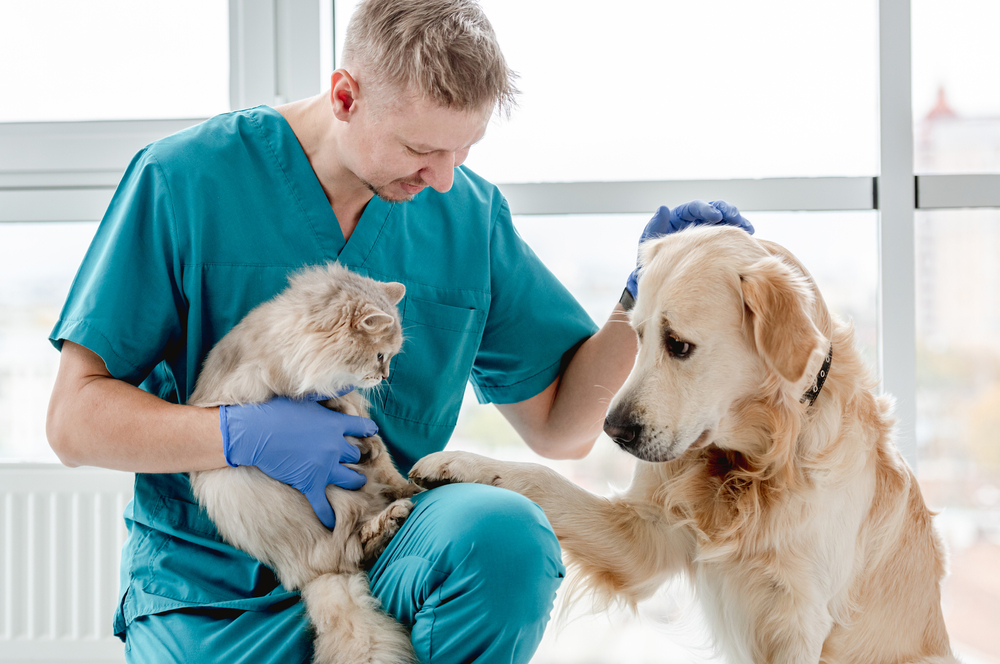We get it. Life gets hectic, and juggling work, family, and pets can leave you looking for a way to take something off your plate. While you may be tempted to skip your pet’s annual wellness visit that you scheduled months ago—your pet looks perfectly healthy—opting out of preventive wellness care can have serious long-term consequences for your pet’s health. Far too often, pet owners don’t discover their pet has a health issue until the condition has advanced. Many diseases are preventable and can be cured or managed if caught in the earliest stages. Routine wellness care allows our Shuler Veterinary Clinic team to support your pet’s health and wellbeing proactively. Learn about common diseases that your pet’s regular wellness exam can help prevent, adding quality years to your pet’s life.
Wellness care for puppies and kittens
Rough-and-tumble puppies and kittens may think they are invincible, but these adorable fluff balls are highly susceptible to disease while their immature immune systems are developing. The care your pet receives during the critical first year of life sets the foundation for a healthy and happy life. Puppies and kittens require three to four wellness exams between 8 and 16 weeks of age to ensure they’re growing and developing properly and are vaccinated against infectious diseases. Every puppy and kitten is unique, and we tailor our vaccination recommendations based on their lifestyle, where you live, and their health status.
Vaccinations protect pets from disease
Vaccinations are an essential part of your pet’s wellness care. They protect your cat or dog from many deadly, preventable diseases, including:
- Rabies — The rabies virus attacks the central nervous system and can be transmitted to pets and people through an infected animal’s bite. Infection signs include fever, excess salivation, mental confusion, and paralysis. Once signs occur, the disease is almost always fatal. Most states require that dogs and cats be vaccinated every one to three years.
- Canine distemper — Commonly diagnosed in puppies and unvaccinated or incompletely vaccinated dogs, distemper is a viral disease that attacks the respiratory, gastrointestinal (GI), and nervous systems. Fortunately, the distemper vaccination provides effective protection against this highly contagious and deadly disease.
- Parvovirus — Parvovirus is one of the most infectious diseases that affects young puppies and unvaccinated dogs and spreads easily through contact with infected feces. Prompt emergency care can improve survival rates, but parvovirus is frequently fatal.
- Canine hepatitis — Adenovirus causes canine hepatitis, which attacks the blood vessel lining, liver, kidneys, spleen, and lungs. Vaccination has reduced this disease’s prevalence, but unvaccinated or immunosuppressed dogs and puppies can contract this potentially fatal disease.
- Feline herpesvirus (FHV-1) — While this viral infection is not contagious to people or dogs, the disease is highly contagious among cats. The virus spreads through contact with an infected cat’s saliva, mucous, or other secretions and can cause serious health problems, including upper respiratory infections and conjunctivitis.
- Feline calicivirus (FCV) — Calicivirus is a major upper respiratory infection cause in cats and is highly contagious. Signs can range from mild to severe and include fever, oral ulcers, and pneumonia. Cats infected with calicivirus can become carriers after recovery and can continue to infect other cats.
- Panleukopenia — Panleukopenia is a highly contagious viral disease most common in kittens and unvaccinated cats. Similar to parvovirus in dogs, panleukopenia has a high mortality rate.
Additional elective (i.e., noncore) vaccines can protect dogs and cats from diseases they may encounter, depending on the places they frequent such as boarding and grooming facilities. Noncore vaccines include:
- Canine influenza
- Bordetella (i.e., kennel cough)
- Leptospirosis
- Lyme disease
Oral care prevents dental disease in pets
Dental disease is common in pets, with most dogs and cats showing signs by age 3. Soon after your pet eats, the bacteria left on their teeth form sticky plaque, which quickly hardens into tartar, trapping oral bacteria in and around the gumline and tooth roots. Without preventive care or treatment, dental disease can lead to loose teeth and infection and cause your pet significant pain. Pets require regular professional veterinary dental checkups and cleanings to maintain good oral health. Professional dental care must be supplemented with regular at-home toothbrushing to prevent plaque and tartar buildup.
Parasite preventives safeguard pets from parasitic diseases
Parasites, such as fleas, ticks, and worms, can transmit harmful diseases to pets and people. However, year-round prevention can safeguard your pet from common parasites, including:
- Mosquitos — Infected mosquitoes can transmit heartworm disease to dogs and cats in a single bite, leading to cardiovascular irritation, inflammation, and deadly blockages.
- Ticks — Ticks can transmit multiple infectious diseases, including Lyme disease, anaplasmosis, and ehrlichiosis.
- Fleas — Many pets have allergic reactions to flea bites that cause extreme itching, hair loss, and skin infections. Fleas can also transmit diseases to pets and people, including bartonellosis (i.e., cat scratch disease), the plague, murine typhus, and tapeworms.
Routine wellness care protects your pet against diseases that could cut their life short, so ensure your pet receives a comprehensive wellness exam at least once per year. Shuler Veterinary Clinic has several sister locations in the Mount Pleasant area, and you can find the one nearest you at Animal Hospitals of the Lowcountry. To help keep your furry friend disease-free, call or book an appointment online for your pet’s annual wellness examination.









Leave A Comment